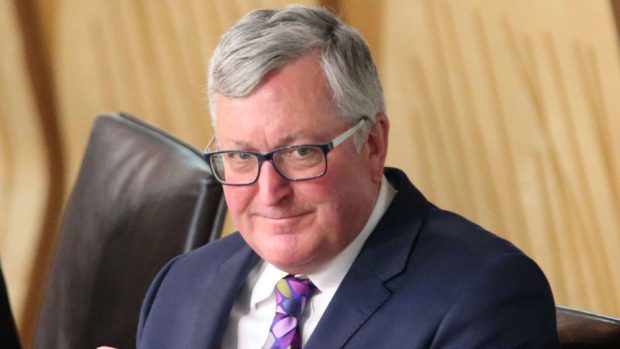Fishing Minister Fergus Ewing aims to “champion” the industry as he sets about trying to right some of the wrongs of the Common Fisheries Policy (CFP).
In his first proper interview on fishing issues since he took over the role from Richard Lochhead in May, Mr Ewing told the Press and Journal early meetings with key players in the sector were constructive.
And he said his initial experience of European Union fisheries policymaking had revealed a “bank of goodwill” towards Scotland.
But he has a major challenge on his hands to win over an industry which has been buoyed by the Brexit vote and now views Holyrood efforts to keep Scotland in the EU as obstructive.
“I want to be the champion of the Scottish fishing industry,” Mr Ewing said, adding his many years of representing Lochaber in the Scottish Parliament meant he was already a “good friend” of Mallaig and North West Fishermen’s Association.
Stressing his intention to “get in aboot it” and make a good impression, he said he had moved quickly to learn the detailed knowledge he needed about the wider sector by meeting fishing chiefs and listening to their concerns.
He added: “I have undertaken to do my very best to … understand the particular needs and interests of the various fisheries around the country.
“I will do that the only way I know how – by putting the hours in and visiting all the ports from which our fishermen are working. This does take time.
“I see my job fairly simply as representing the fishing industry to the best of my ability, helped by a strong team of very able and informed advisers.”
Mr Ewing used the rugby expression “hospital pass” to describe how some people may have viewed his initiation into the role of cabinet secretary for the rural economy and connectivity, although he does not see it that way.
Referring to the Common Agricultural Policy payments debacle, in which the Scottish Government was judged to have mishandled the delivery of payouts, he said: “The day I was sworn in coincided with what some said was the most damning report ever issued by Audit Scotland. It was a difficult start.
“I think we’’ve broken the back of that challenge and it has taken up a good deal of my time … but I have at my behest met the SFF (Scottish Fishermen’s Federation) twice in the past fortnight.”
Fishing chiefs did not “beat about the bush” in these encounters, he said, adding the meetings were invaluable for discussing Scotland’s uncertain political future.
He said: “Plainly, there are a number of fishermen who feel very strongly that out (of the EU) is the better option.
“We (the Scottish Government) have to represent everybody and in my case I have to get the best possible deal for fishermen.”
Mr Ewing said industry chiefs had reaffirmed their commitment to sustainable fisheries and did not wish to see a free-for-all in the North Sea.
He added there were also important unresolved issues in the Brexit strategy, such as continued access to a single EU market which accounts for the bulk of Scottish seafood exports and the processing sector’s reliance on migrant workers.
And he said he aimed to “bridge the gap” between industry and Holyrood perspectives on Brexit through goodwill and a strong working relationship.
The minister said the CFP’s flaws were fully recognised, while the government was continuing to help tackle some of the difficulties created by the fish discard ban.
“Problems can be solved, he said, highlighting the need to urgently find a way to stop “choke species” eating up quota, closing fisheries and leaving the industry in a situation akin to Marks and Spencer shutting down every February for the remainder of the year.
He said he was already “all over” delicate negotiations involving monkfish quota swaps, adding: “They (the industry) must have a minister who is willing to work hard to put their case to London, Brussels or wherever.
“I have a massive amount to learn and am looking forward to learning it in places like Lerwick, Peterhead, Mallaig and Stornoway.”
